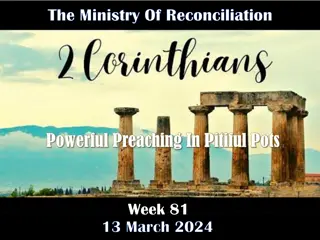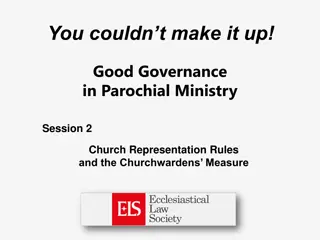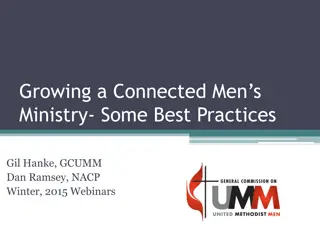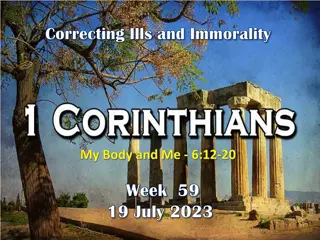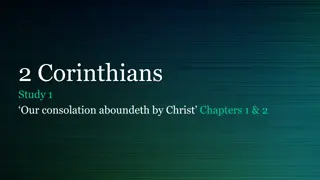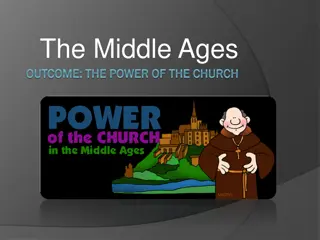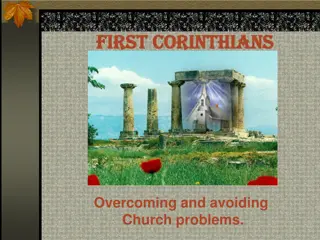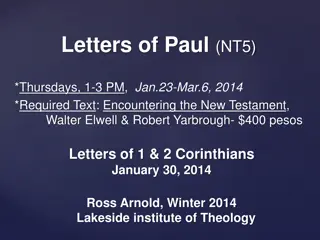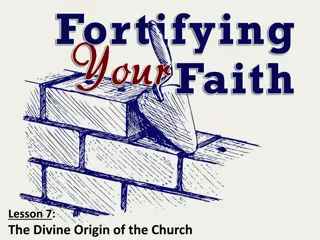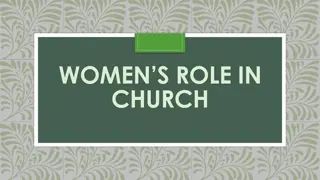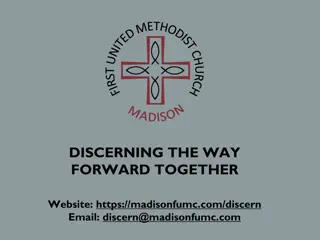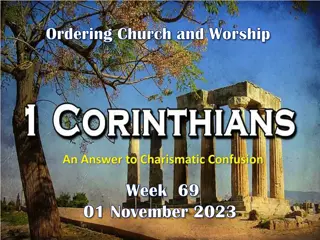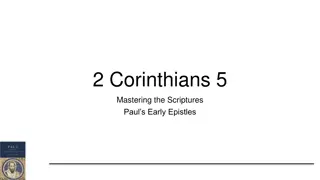Challenges Faced by the Early Church: Insights from 2 Corinthians
The early church, as depicted in the book of 2 Corinthians, encountered various challenges such as persecution, racial tensions, material wealth issues, false teachings, famine, and poverty. The letters of Paul to the Corinthians provide valuable insights into how these challenges were addressed and overcome, offering timeless lessons for modern-day believers.
Download Presentation

Please find below an Image/Link to download the presentation.
The content on the website is provided AS IS for your information and personal use only. It may not be sold, licensed, or shared on other websites without obtaining consent from the author. Download presentation by click this link. If you encounter any issues during the download, it is possible that the publisher has removed the file from their server.
E N D
Presentation Transcript
SCRIPTURE 2 CORINTHIANS 1: 1 - 7 1 Paul, an apostle of Jesus Christ by the will of God, and Timothy our brother, To the church of God which is at Corinth, with all the saints who are in all Achaia: 2Grace to you and peace from God our Father and the Lord Jesus Christ. Comfort in Suffering 3Blessed be the God and Father of our Lord Jesus Christ, the Father of mercies and God of all comfort,4who comforts us in all our tribulation, that we may be able to comfort those who are in any trouble, with the comfort with which we ourselves are comforted by God.5For as the sufferings of Christ abound in us, so our consolation also abounds through Christ.6Now if we are afflicted, it is for your consolation and salvation, which is effective for enduring the same sufferings which we also suffer. Or if we are comforted, it is for your consolation and salvation.7And our hope for you is steadfast, because we know that as you are partakers of the sufferings, so also you will partake of the consolation.
SCRIPTURE 2 CORINTHIANS 8-11 Delivered from Suffering 8For we do not want you to be ignorant, brethren, of our trouble which came to us in Asia: that we were burdened beyond measure, above strength, so that we despaired even of life.9Yes, we had the sentence of death in ourselves, that we should not trust in ourselves but in God who raises the dead,10who delivered us from so great a death, and does deliver us; in whom we trust that He will still deliver us,11you also helping together in prayer for us, that thanks may be given by many persons on our behalf for the gift granted to us through many.
INTRODUCTION Ever since the first century, the church has experienced challenges to making disciples of all nations. Shortly after Pentecost, persecution arose against the believers (Acts 4:1 3). Later, internal struggles along racial lines developed (Acts 6:1). Peter would have to be convinced by a vision and voice from God that He was concerned about the Gentiles (Acts 10).
Because of tension between the Jewish and Gentile churches, the Jerusalem Council had to provide guidance as to how the matter should be resolved (Acts 15:1 35) and fellowship maintained. Some churches struggled with material wealth and apathy (Revelation 3:15 19). Others struggled with false teachings (Galatians 1:6 7; 2 John 7 11). There were churches not immune to the external problems of famine (Acts 11:27 30) and poverty (Acts 3:2; Galatians 2:10).
THE CORINTHIANS LETTER The second letter of Paul to the Corinthians is probably the least known of all his letters. It has sometimes been called "Paul's unknown letter. First Corinthians is very well-known among his writings, but many people feel that Second Corinthians is heavy reading. In First Corinthians we looked at the church at Corinth. That is a very instructive letter, because the church in Toronto today is very much like the church in Corinth was; we live in "Corinthian" conditions now.
But in Second Corinthians we are looking at Paul; he is the one in focus as he lays himself open and reveals himself to the church. This is a very personal letter from the heart of this mighty apostle. Here we see him more clearly, perhaps, than anywhere else in Scripture.
PRESSURE AND THE ANTIDOTE 1. AFFLICTION Two words, affliction, and comfort, stand out repeatedly in that passage; and the two always go together: Affliction is what we today would probably call pressure, or stress. It is whatever ties knots in your stomach and makes you feel anxious or troubled about what lies ahead. It is what makes for hectic days and sleepless nights. It is continually on your mind and threatens your well-being; it refuses to go away and leave you alone; it depresses you.
Now that is pressure, stress, and we all live in it. But they were not any different in the 1st century. They lived under pressure and stress just as we do. Paul experienced it as well, but along with it he experienced the comfort of God.
2. COMFORT Now, comfort is more than just a little cheer or friendly word of encouragement. Paul does not mean that. The word basically means "to strengthen." What Paul experienced was the strengthening of God to give him a peaceful, restful spirit to meet the pressure and the stress with which he lived. "Strengthen," in the Greek, is a word that is used also for the Holy Spirit. "The Comforter," but really it is "The Strengthener," the one who strengthens you. This is God's provision for affliction.
1. Always blessed the Lord 2 Corinthians 1: 3 - Blessed be the God and Father of our Lord Jesus Christ, the Father of mercies and God of all comfort. 4 who comforts us in all our tribulation, that we may be able to comfort those who are in any trouble, with the comfort with which we ourselves are comforted by God. "Blessed be the God and Father of our Lord Jesus Christ." He praised God for the circumstances of his life even though there are afflictions. He calls God the "Father of mercies and God of all comfort." He sees God's hand as having sent these very things into his life. He sees them as opportunities for the release of the strength of God.
2. The strengthening is exactly equal to the pressure. 2 Corinthians 1: 5 For as the sufferings of Christ abound in us, so our consolation also abounds through Christ. The strengthening is exactly equal to the pressure. That is a disciple lifestyle; that is what every disciple ought to be able to experience. The Disciple reaction to troubles and pressures is to see them all as sent by a loving God who is still in control, who will limit them as he promised so they will not be more than you are able to bear. He has sent them deliberately in order that you might discover the inner strengthening that can keep your heart at peace, no matter what the pressure is.
3. Its so you can help someone else 2 Corinthians 1: 6- Now if we are afflicted, it is for your consolation and salvation, which is effective for enduring the same sufferings which we also suffer. Or if we are comforted, it is for your consolation and salvation. I think the older you grow as a followers of Christ the more this becomes true. Your sufferings are not sent for you so much as they are for someone who is watching you, and seeing how you handle the pressure that you are going through. Older Christians easily forget that younger Christians are watching them all the time.
When we have sufferings sent to us, they are often sent so that others watching us will know that they can be sustained. Patiently endure, trusting God that he is in charge, and he is taking you through this. He is not taking it away, he is taking you through it, so you patiently wait, rejoicing that the end is in sight; this too shall pass.
4. An unshaken Hope 2 Corinthians 1: 7 And our hope for you is steadfast, because we know that as you are partakers of the sufferings, so also you will partake of the consolation. Paul says to these Corinthians, "Our hope for you is unshaken. We've heard you are going through trials and difficulties and pressures and persecutions, but we're not disturbed. He encourages them to go through this. This is why Christians ought to share their problems, their struggles, their failures and their successes with each other, freely and openly, thus we encourage one another.
Not always for our sake, but someone else's sake. We have been brought along and matured to the point where we can take it, and rejoice in it, and handle it rightly. When we do, what a lesson we are giving to those who are following along behind.
5. At Your Lowest Point 2 Corinthians 2: 8-10 - For we do not want you to be ignorant, brethren, of our trouble which came to us in Asia: that we were burdened beyond measure, above strength, so that we despaired even of life.9Yes, we had the sentence of death in ourselves, that we should not trust in ourselves but in God who raises the dead,10who delivered us from so great a death, and does deliver us; in whom we trust that He will still deliver us. He tells us that he was "utterly, unbearably crushed." That is the lowest ebb the human spirit can come to, the uttermost sense of despair. "Why," he said, "we felt that we had received the sentence of death." It was absolutely hopeless; he had given up; there was no way out. He could see himself losing his life at this point.
But then he adds, "but that was to make us rely not on ourselves. But do you see how Paul comes to a knowledge of the true Disciple lifestyle? God delivered us -- in the past; He is delivering us -- in the present; He will deliver us -- in the future. Paul has learned to trust God to take him through whatever life throws at him, no matter what it is. Now that is a Disciple lifestyle. We should see these as opportunities to display an alternative lifestyle, and release in our own lives a quiet power that will keep our hearts at peace, because we know that an adequate God is handling the situation; he will take us safely through.
Closing Pray with me 2 Corinthians 1: 11 You also helping together in prayer for us, that thanks may be given by many persons on our behalf for the gift granted to us through many. Once again, suffering is sent to us to show us that we are not individuals living all alone in life. We are members of a family, we are members of a Body, and we need each other. When you have difficulty or a trial, share it with others so that they can pray with you, for many prayers will bring great deliverance.
Paul says, therefore, "You must help us by prayer," so that there will be great thanksgiving for the great blessing that comes from many prayers. That is the reason for requests for prayer, for sharing our needs with one another, and for enlisting the aid of others in praying us through times of pressure, as we ought to be ready to respond to those who are going through pressure with prayer for them ourselves. Now that is the way the Christian community ought to respond to stress and pressure, to difficulties and trials and disasters. God has sent them. God has allowed them to come as opportunities that you might learn again this amazing secret of inner strength, inner comfort, and inner peace that can keep your heart quiet, even though you are going through troubled times.


